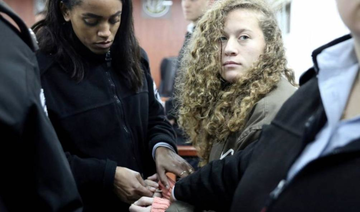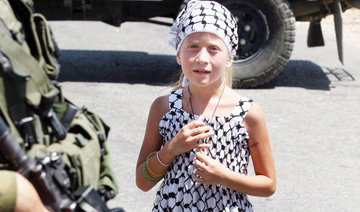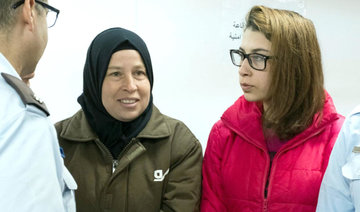NABI SALEH, West Bank: Palestinian protest icon Ahed Tamimi is to go on trial before an Israeli military court on Tuesday for slapping and punching two Israeli soldiers — an act Palestinians say embodies their David vs. Goliath struggle against a brutal military occupation and Israel portrays as a staged provocation meant to embarrass its military.
Israel’s full-throttle prosecution of Tamimi, one of an estimated 300 Palestinian minors in Israeli jails, and a senior Israeli official’s recent stunning revelation that he once had parliament investigate whether the blond, blue-eyed Tamimis are a “real” Palestinian family have helped stoke ongoing interest in the case.
The teen with the curly mane of hair, who turned 17 in jail last month, has become the latest symbol of the long-running battle between Palestinians and Israelis over global public opinion.
The case touches on what constitutes legitimate resistance to Israel’s rule over millions of Palestinians, already in its 51st year after Israel captured the West Bank, Gaza Strip and east Jerusalem in 1967.
Ahed Tamimi’s supporters see a brave girl who struck two armed soldiers outside her West Bank home in frustration after having just learned that Israeli troops seriously wounded a 15-year-old cousin, shooting him in the head from close range with a rubber bullet during nearby stone-throwing clashes.
Israel has treated Tamimi’s actions as a criminal offense, indicting her on charges of assault and incitement that could potentially land her in prison for several years.
Tamimi’s middle-of-the-night arrest from her home in December and her pre-trial court appearances, flanked by Israeli guards and looking impassive, have evoked a sense of history on a loop. Another generation of Palestinians seems locked in a cycle of protests and arrests by Israel, three decades after Palestinians staged their first uprising, throwing stones and burning tires in the streets.
Since the mid-1990s, several US-mediated rounds of Israeli-Palestinian negotiations on setting up a Palestinian state alongside Israel have ended in failure. Gaps in positions only widened in the past decade, as Israeli settlement expansion continued and the Palestinians failed to end a crippling political split between an internationally backed self-rule government in parts of the West Bank and the Islamic militant group Hamas which dominates Gaza.
Tamimi’s father Bassem, who threw his first stone at the age of 14 and was an activist in the first uprising, said he expects the military court will deal harshly with his daughter and that she might remain in prison for some time.
His wife, Nariman, is being prosecuted in the same December 15 scuffle in their village of Nabi Saleh and has been locked up alongside their daughter.
Despite the personal pain, the father said he is optimistic heading into the courtroom and that he believes he is witnessing progress.
He argues that his daughter’s case and the outpouring of support for her — more than 1.7 million people have already signed an online petition calling for her release — signal the beginning of the final chapter of Israel’s occupation.
“I see that we are starting the turning point in our history, to deal with our occupier and colonization in a different way,” said Tamimi. “Yes, there is a price (to pay) ... but this generation Ahed represents will be the generation of freedom.”
Yaakov Amidror, a former national security adviser to Israeli Prime Minister Benjamin Netanyahu, doesn’t believe the trial will hurt Israel’s image, saying that “those who are against Israel will be against it if she (Tamimi) is brought to court or if she is not.”
Amidror played down the findings of a recent Pew poll that indicated younger, liberal Americans are less supportive of Israel’s narrative than older generations. He portrayed young liberals as naive and said he expects their views to change as they get older, but added that Israel needs to work “very, very hard not to lose these people.”
In Nabi Saleh, Bassem Tamimi has used the interest in his daughter’s case to generate more support, saying he has hosted hundreds of foreigners in his home since her Dec. 19 arrest. His living room is decorated with several “Free Ahed” posters and one of Nariman.
On a recent morning, he met with volunteer observers from Switzerland, Sweden, Colombia, Argentina and Britain, going over the details of Ahed’s case and explaining his political views, including his support for a single, bi-national state in which Israelis and Palestinians enjoy equal rights.
The visitors, part of a program that typically has them touring the West Bank for three months, listened intently and jotted down some of what he said. “Your notes will be part of history in the near future,” he told them. “And we will put it in a museum.”
The visit ended with hugs, tears and a group photo on his porch, against the backdrop of Nabi Saleh, a village of about 600 members of the extended Tamimi clan.
After the group left, Bassem Tamimi got word that Hebrew graffiti had popped up on several walls in the village, but that teenagers were trying to cover up the threatening messages.
He rushed to the area, a few hundred meters (yards) from an army watchtower at the edge of the village, to try to preserve what he felt were valuable tools in the PR battle with Israel.
The first slogan called for the death penalty for Ahed. A second read: “The Tamimi family has no place in the Land of Israel.” A third warned: “Greetings from the retaliation branch of the IDF.”
As he took photos and video to be posted on social media, a dozen teenagers, some masked, headed toward the watchtower for weekly stone-throwing clashes with soldiers.
Worried that they might try to spray over the graffiti, Tamimi shouted, “Leave it, leave it,” as the group walked past him.
The boys began throwing stones toward a main road that separates Nabi Saleh from the Israeli settlement of Halamish, built in part on expropriated village land. Several soldiers arrived and fired stun grenades and rubber coated steel pellets.
From her second-floor balcony, Fattoum Tartier, a 41-year-old English teacher, kept an eye on her 11-year-old son, Hussein, in the street below to make sure he didn’t join the clashes.
“I want my children to live a good life, like everyone else in other parts of the world,” she said, her words punctuated by the booms from stun grenades.
Israeli military court to try Palestinian teen protest icon
Israeli military court to try Palestinian teen protest icon

King Abdullah of Jordan discusses Gaza during summit with Egyptian, French presidents in Cairo

- Leaders urge global community to advocate for end to Israeli war in the enclave
- Israeli attacks undermine diplomatic efforts, risk dragging region into chaos, Jordanian ruler warns
LONDON: King Abdullah II of Jordan emphasized the need to halt the Israeli offensive in Gaza during a summit with Egyptian President Abdel Fattah El-Sisi and French President Emmanuel Macron in Cairo.
The leaders on Monday urged the international community to advocate for an end to the Israeli war in Gaza, restore the ceasefire agreement, and ensure the delivery of humanitarian aid to the Palestinian coastal enclave.
King Abdullah said that Israeli attacks on Gaza undermine all diplomatic and humanitarian efforts to resolve the crisis and risk dragging the entire Middle East into chaos, the Petra news agency reported.
He stressed the need for a political solution based on the two-state vision, which would ensure security and stability for both Palestinians and Israelis.
King Abdullah said that Jordan opposes the displacement of Palestinians in Gaza and the West Bank, warning against Israeli unilateral actions and assaults on Muslim and Christian holy sites in Jerusalem, the Petra added.
The Jordanian ruler and El-Sisi welcomed France’s support for resolving the Palestinian issue. They highlighted the need for international cooperation, especially from EU countries, including France, to aid in Gaza’s reconstruction.
After arriving in Cairo on Sunday, Macron will travel to Al-Arish, 50 kilometers from the Gaza Strip, on Tuesday to meet with humanitarian and security authorities, and push for a ceasefire. On Monday, he expressed strong opposition to any displacement or annexation in Gaza and the Israeli-occupied West Bank.
King Abdullah, El-Sisi, and Macron highlighted the need for a political solution to establish an independent Palestinian state with East Jerusalem as its capital, aiming for lasting peace, the Petra reported.
The Jordanian delegation included the Minister of Foreign Affairs and Expatriate Affairs, Ayman Safadi; Director of the King’s Office, Alaa Batayneh, and the Ambassador to Cairo, Amjad Al-Adaileh.
UAE to host World Crisis and Emergency Management Summit 2025 in Abu Dhabi

- Forum to be held under patronage of Sheikh Tahnoon bin Zayed Al-Nahyan, deputy ruler of Abu Dhabi and national security adviser
- Sheikh Tahnoon highlights UAE’s efforts to address crises, emergencies, and disasters worldwide
LONDON: Global resilience and policies for mitigating future risks will be explored at the World Crisis and Emergency Management Summit 2025 hosted by the UAE in Abu Dhabi this week.
The summit will be held under the patronage of Sheikh Tahnoon bin Zayed Al-Nahyan, deputy ruler of Abu Dhabi and national security adviser, from April 8-9 under the theme “Together Towards Building Global Resilience.”
Sheikh Tahnoon said the summit reflects the UAE’s “firm belief that international cooperation and cross-border collaboration are vital to achieving true global resilience.”
He highlighted Abu Dhabi’s efforts to address crises, emergencies, and disasters worldwide, the Emirate News Agency reported.
“Our strategic deployment of artificial intelligence and cutting-edge innovations places us at the forefront of leveraging technology to enhance emergency preparedness and response systems,” Sheikh Tahnoon said.
This year’s summit will focus on global resilience, strategic foresight, and enhancing partnerships among governments, international organizations, and the private sector.
Emerging technologies, particularly artificial intelligence and advanced communication systems, will also be discussed, the WAM added.
The summit will bring together decision-makers and experts, and feature two exhibitions: the Crisis Management Technologies Exhibition 2025 and the Generation Readiness Exhibition 2025. Both will explore the connections between technology and education to promote resilient, preparedness-oriented societies.
Sheikh Tahnoon said the UAE has consistently led efforts to deliver urgent aid to crisis-stricken communities worldwide, and the summit reflects Abu Dhabi’s commitment to unifying global humanitarian initiatives and strengthening international solidarity.
“We are confident that the dialogues and outcomes of this summit will generate shared insights and unify aspirations, contributing meaningfully to the creation of a safer, more sustainable, and prosperous future for all of humanity,” he added.
Palestinians in West Bank strike to demand end to Gaza war

- A coalition of Palestinian political movements — including rivals Fatah and Hamas — called the strike to protest what they described as “the genocide and the ongoing massacre of our people”
- Israel resumed air strikes on Gaza on March 18, ending nearly two months of ceasefire with Hamas
RAMALLAH: Shuttered storefronts lined empty streets in Israeli-annexed east Jerusalem and the occupied West Bank on Monday, as Palestinians held a general strike demanding an end to the Gaza war.
“I walked through the city today and couldn’t find a single place that was open,” Fadi Saadi, a shopkeeper in Bethlehem, told AFP.
Shops, schools and most public administrative offices were closed across the West Bank, which Israel has occupied since 1967.
A coalition of Palestinian political movements — including rivals Fatah and Hamas — called the strike to protest what they described as “the genocide and the ongoing massacre of our people.”
It called for the strike “in all the occupied Palestinian territories, in the refugee camps... and among those who support our cause.”
Israel resumed air strikes on Gaza on March 18, ending nearly two months of ceasefire with Hamas. Dozens of Palestinians have been killed almost daily since Israel restarted its military offensive.
“We close today about our family in Gaza, our children in Gaza,” said Imad Salman, 68, who owns a souvenir shop in Jerusalem’s Old City.
“In Jerusalem, in the West Bank, we can’t do something more than what we’re doing here now,” he told AFP.
In Israeli-annexed east Jerusalem, the usually bustling commercial Salaheddin street was empty.
“This strike is in solidarity with Gaza and what is happening there, and the war being waged against the Palestinian people, whether by (US President Donald) Trump, (Israeli Prime Minister Benjamin) Netanyahu, the Israeli government, or the American government,” said Ahmed, who did not want to his surname.
“This war must stop, the killing and destruction must stop, and only peace should prevail — peace, and nothing but peace.”
A rally is planned Monday in the center of the West Bank city of Ramallah, where the Palestinian Authority has its headquarters.
“This time, the strike is serious, and the population’s commitment is significant because Israeli aggression now affects all Palestinian households, whether in the West Bank or Gaza,” said Issam Baker, a community organizer in Ramallah.
“We have seen total commitment in support of the strike today throughout the West Bank, which has not happened since October 7” 2023, when the Gaza war started, said a security source from the Palestinian Authority.
Since the start of the Gaza war, violence has soared in the West Bank.
Israeli troops or settlers have killed at least 918 Palestinians, including militants, in the territory since then, according to health ministry figures.
Palestinian attacks and clashes during military raids have killed at least 33 Israelis, including soldiers, over the same period, according to official figures.
Dutch tighten controls on military and dual use exports to Israel

AMSTERDAM: The Dutch government said on Monday it had tightened export controls for all military and ‘dual use’ goods destined for Israel.
All direct exports and the transit of these goods to Israel will be checked to see if they comply with European regulations, and will no longer be covered by general export licenses, the government said in a letter to parliament.
“This is desirable considering the security situation in Israel, the Palestinian territories and the wider region,” foreign minister Caspar Veldkamp and trade minister Reinette Klever wrote.
“Exporters will still be able to request permits, that will then be checked against European regulations.”
The government said no military goods for Israel had been exported from the Netherlands under a general permit since Israel started its war in Gaza following the attacks by Hamas on October 7, 2023.
It said that the general license for the export of “low risk information security goods,” such as routers for network security, was frequently used for export to Israel.
It estimated that between 50 and 100 permits for the export of those goods would now have to be requested on an individual basis.
A Dutch court last year ordered the government to block all exports of F-35 fighter jet parts to Israel over concerns they were being used to violate international law during the war in Gaza. Israel denies violating international law.
Dossier accuses British serving in Israeli military of war crimes in Gaza

- Report compiled by Hague-based UK lawyers will be handed to Metropolitan Police
- ‘British nationals are under a legal obligation not to collude with crimes committed in Palestine’
LONDON: A group of UK citizens who served with the Israeli military in Gaza will be the subject of a war crimes complaint handed to the Metropolitan Police, The Guardian reported on Monday.
A 240-page dossier compiled by a group of lawyers based in The Hague documents the activities of 10 Brits in Gaza, with complaints against them including alleged targeting of civilians and aid workers, coordinated attacks on hospitals and protected sites, and the forced displacement of people.
The dossier, which covers the period from October 2023 to May 2024 and took six months to compile, will be handed to the Met’s war crimes unit.
The complaint against the 10 Brits, who cannot be named for legal reasons, will be brought on behalf of the Gaza-based Palestinian Centre for Human Rights and the UK-based Public Interest Law Centre.
The dossier includes eyewitness testimony from civilians in Gaza. One passage features evidence from a witness who recalled an attack on a hospital, including seeing corpses “scattered on the ground, especially in the middle of the hospital courtyard, where many dead bodies were buried in a mass grave.”
The account added that a bulldozer being used to demolish part of the hospital “ran over a dead body in a horrific and heart-wrenching scene desecrating the dead.”
Raji Sourani, director of the PCHR, said: “This is illegal, this is inhuman and enough is enough. The government cannot say we didn’t know; we are providing them with all the evidence.”
PILC legal director Paul Heron said: “We’re filing our report to make clear these war crimes are not in our name.”
The 2001 International Criminal Court Act says it “is an offence against the law of England and Wales for a person to commit genocide, a crime against humanity, or a war crime.”
Michael Mansfield KC, the lawyer leading the group, said: “If one of our nationals is committing an offence, we ought to be doing something about it. Even if we can’t stop the government of foreign countries behaving badly, we can at least stop our nationals from behaving badly.
“British nationals are under a legal obligation not to collude with crimes committed in Palestine. No one is above the law.”
Sean Summerfield, a barrister who also worked on the dossier, said: “The public will be shocked, I would have thought, to hear that there’s credible evidence that Brits have been directly involved in committing some of those atrocities.”
More than 50,000 Palestinians have been killed in Gaza since October 2023.





















